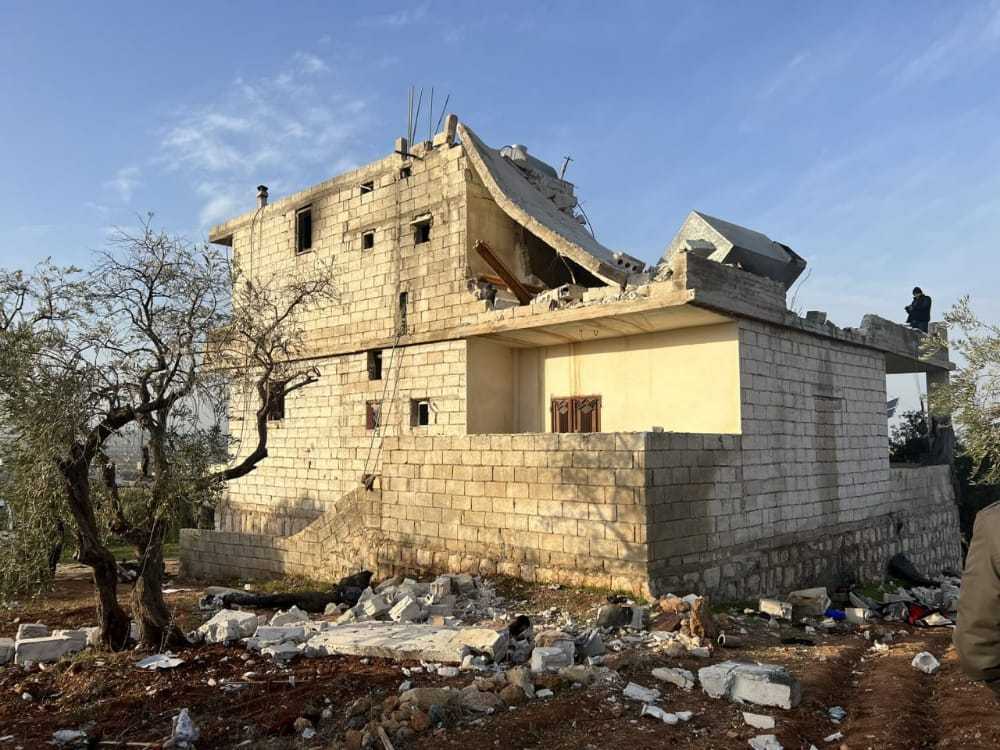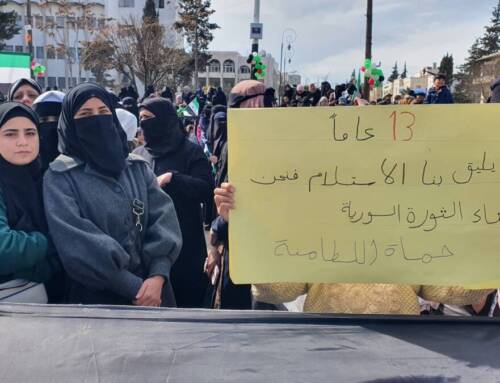Idlib residents pay the price for the war on terror
As US-led coalition forces target Islamic State and al-Qaeda figures in densely-populated Idlib province, civilians find themselves in the crosshairs, facing death, injury, and property damage.
21 February 2022
IDLIB — Eleven months after renting out a residence belonging to his son living in Germany, Abu Qutaiba al-Sheikh was surprised to learn the tenant was the leader of the Islamic State (IS), Abdullah Qardash, after he was killed in a pre-dawn US airdrop operation in the Atma region of northwestern Syria on February 3.
When the operation began, the al-Sheikh family heard their son’s three-story house “had been bombed, and there were clashes between the attackers and tenants inside,” Abu Qutaiba told Syria Direct.
Abu Qutaiba had entered into a lease agreement “with a person called Mustafa Sayyed Ahmad, from the Aleppo countryside,” he said, adding that he did not know “the tenant’s real identity until the US Department of Defense announced the details of the operation, and that the target was the internationally wanted leader of IS.”
IS leaders have in the past used fake identification cards issued by the opposition local councils in northwestern Syria. Former IS leader Fayez al-Akal, for example, used a fake ID issued by the eastern Aleppo countryside town of Akhtarin before he was killed in an international coalition drone strike in June 2020.
The al-Sheikh family received $80 a month for the apartment where Qardash lived, according to Abu Qutaiba, meaning the total amount they received is not enough to cover the approximately $2,000 needed to repair the three-story building, now badly damaged.
Fatima al-Omar (a pseudonym), 35, was also blindsided by the news of Qardash’s killing. Displaced from the western Aleppo countryside to the Atma border area with Turkey in early 2020, she lived downstairs in the same building. “All we knew was that our upstairs neighbor was called Abu Ahmad and lived with his sister,” she told Syria Direct.
During the raid, al-Omar and her three children were terrified, “especially since the attackers stormed our house and forced us out.” But worse than that, she says, is that “people think we were IS collaborators.” Now, the family is looking for “a new place to live, or we will move to one of the nearby camps.”
Hiding among the displaced
Areas on the border with Turkey, including Atma, host the largest number of people displaced to northwestern Syria, who make up more than half of the estimated 4.5 million people living in Idlib province. Among the Syrians are dozens of foreign families.
For that reason, “foreign IS leaders find this area as a refuge to go underground, exploiting their ability to rent through the displaced foreign families,” said Orabi Orabi, a Syrian researcher specializing in jihadist movements. “Places where displaced people gather are less dangerous for IS—a newcomer can get lost among the displaced.”
International humanitarian law allows, in times of war, for the “targeting of terrorist facilities and individuals within civilian areas, so long as it does not lead to civilian casualties and that there is a distinction between civilian and military targets,” said Fadel Abdul Ghani, the director of the Syrian Network for Human Rights (SNHR).
“Hiding IS terrorists in places where civilians gather, especially Idlib, which the organization considers enemy territory and where it has caused calamity, is a clear violation from a legal perspective, as it puts civilians at risk,” said Abdul Ghani. However, that “does not absolve the attacking forces of responsibility for safeguarding civilian lives and property, or compensating them in the case of harm.”
Methods used by the international coalition to target wanted individuals vary, but the most-used in Idlib are “precision drone strikes, and their damage is often limited to the targeted individual,” according to Orabi. He noted that “using other methods that may increase the percentage of harm to civilians is determined by a number of coalition considerations.”
In the case of the airdrop operation that resulted in the death of Qardash, and the previous operation against his predecessor Abu Bakr al-Baghdadi in 2019, “the coalition’s objective was to capture the target alive, because that would achieve a security and military victory for the US,” said Orabi. If achieved, he added, the US “would hold all the secrets of IS.”
Also, using drones against first-line IS commanders “does not give the coalition conclusive evidence that the targeted individual was killed, nor does it allow them to take the body and samples to confirm who they belong to in a lab,” said Orabi.
Civilians pay the price
Hay’at Tahrir al-Sham (HTS) did not initially react to the Qardash operation, which took place in its areas of influence, 500 meters from the Deir Balout checkpoint, the largest HTS checkpoint in the area. The checkpoint was evacuated coinciding with the airdrop operation. HTS ultimately issued a statement on February 6 denying prior knowledge of the operation.
The October 2019 coalition operation targeting the first leader of IS, Abu Bakr al-Baghdadi, took place in the Idlib countryside village of Barisha, which is also under HTS control.
Apart from material damage to the building, the Qardash operation led to the deaths of 13 people, including four women and six children, according to a statement issued by the Syrian Civil Defense. However, “it is unclear if the victims were killed by bombardment or if one of the targets blew himself up,” said Abdul Ghani. The victims “fall under the civilian designation, so long as it has not been confirmed if they carried weapons or not,” he said.
Therefore, SNHR calls on the US-led coalition to “open thorough investigations to determine the women and children’s cause of death, and how they were killed,” said Abdul Ghani. The burden of “proof falls on the coalition,” he said, “considering that its operations are shrouded in secrecy. Otherwise, we are looking at a violation against civilians.”
“What happened violates our property rights, which the attacking force did not take into account since it caused damage to the building” said Abu Qutaiba, referring to the operation to kill Qardash. He condemned that the operation took place in Atma, an area overcrowded with displaced people, without, from his perspective, “taking special measures to preserve their lives in such military operations.”
The Qardash operation was not the first to harm civilians in Syria or cause material damage to their property. In May 2019, the US-led coalition acknowledged that 1,300 civilians were “unintentionally” killed in anti-IS operations in Syria and Iraq since 2014. Independent monitors and organizations have estimated that the number of civilian casualties may be much higher.
In December 2019, Ahmad Muhamad al-Qassoum, 45, was driving with his wife and children on the Ariha-Idlib road when he passed alongside a motorcycle that was targeted by a coalition drone. US Central Command said at the time that there was a possibility civilians were injured in the strike, carried out by an MQ-9 aircraft, against “an al-Qaeda leader.”
Among civilians, it is commonly thought that “international coalition operations are precise,” said al-Qassoum, whose family is displaced from the Idlib countryside town of Kafr Batikh and currently living in the Aleppo countryside city of Afrin. But the strike injured his wife and children and “caused my 10-year-old son Mahmoud to need a skull reconstruction operation that costs $1,500. It hasn’t been done so far, and since then we’ve been giving him an anticonvulsant constantly,” he said. Al-Qassoum’s wife lost “part of her heel, which is stabilized in a fixation device and needs further surgery.”
Despite civilian casualties and harm from operations targeting individuals wanted by the US-led coalition in Idlib, “the coalition has not compensated the relatives of victims or those impacted,” said Orabi. “The US Congress allocated $3 million in the Pentagon’s Defense Authorization Act in 2020 to pay civilians affected by Washington’s military operations abroad, but not a dollar of this budget was spent and the sum returned to the Treasury Department.”
For its part, the HTS-backed Syrian Salvation Government (SSG), as the de facto authority in the area, also has not compensated civilians hurt by international coalition operations. Syria Direct attempted to obtain a statement from the SSG but did not receive a response by time of publication.
The families of victims are left alone, facing the repercussions of these operations, said al-Qassoum. He stressed his family’s right “to receive full [medical] treatment, as well as fair compensation.”
“Our only fault is that we were on our way to visit my children’s grandfather when the motorcycle was hit by a drone.”
This report was originally published in Arabic and translated into English by Mateo Nelson.







